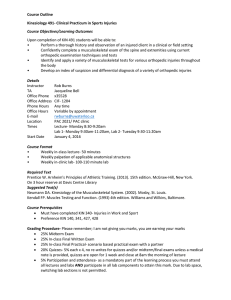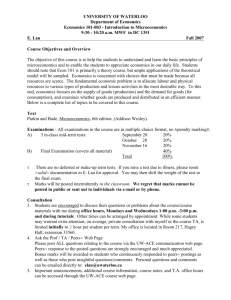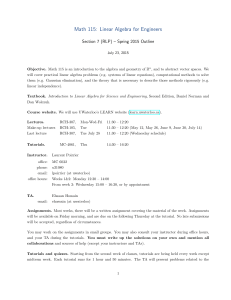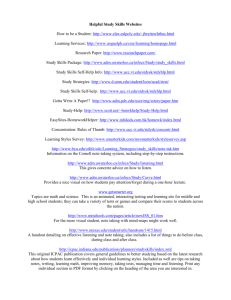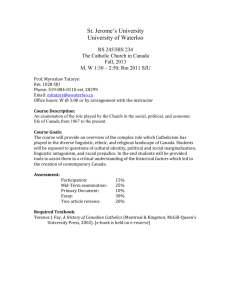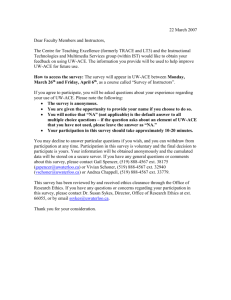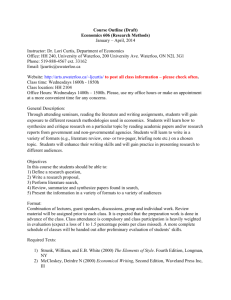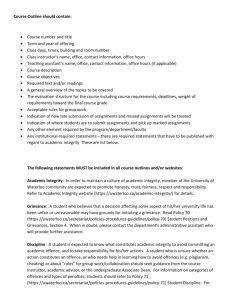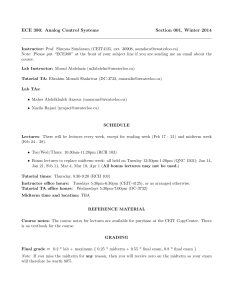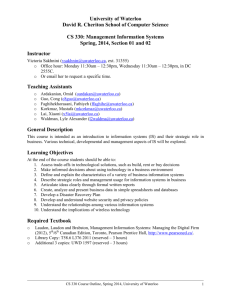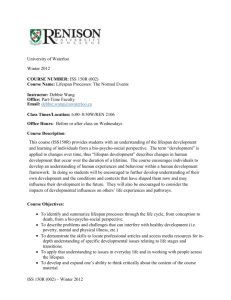University of Waterloo Department of Electrical and Computer
advertisement
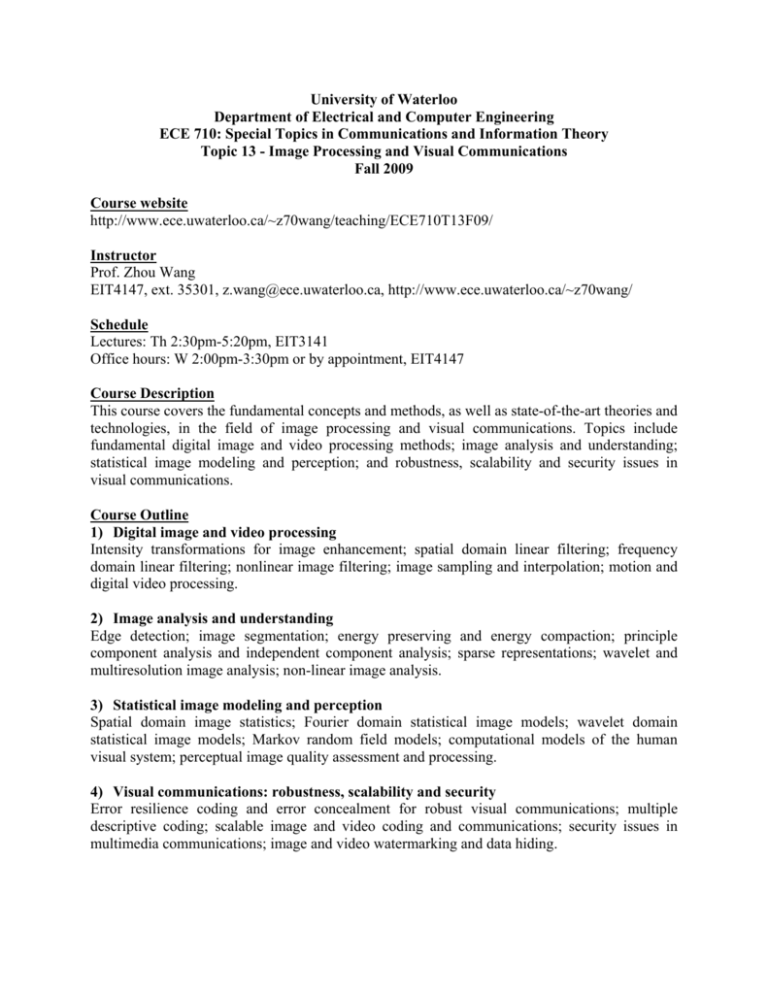
University of Waterloo Department of Electrical and Computer Engineering ECE 710: Special Topics in Communications and Information Theory Topic 13 - Image Processing and Visual Communications Fall 2009 Course website http://www.ece.uwaterloo.ca/~z70wang/teaching/ECE710T13F09/ Instructor Prof. Zhou Wang EIT4147, ext. 35301, z.wang@ece.uwaterloo.ca, http://www.ece.uwaterloo.ca/~z70wang/ Schedule Lectures: Th 2:30pm-5:20pm, EIT3141 Office hours: W 2:00pm-3:30pm or by appointment, EIT4147 Course Description This course covers the fundamental concepts and methods, as well as state-of-the-art theories and technologies, in the field of image processing and visual communications. Topics include fundamental digital image and video processing methods; image analysis and understanding; statistical image modeling and perception; and robustness, scalability and security issues in visual communications. Course Outline 1) Digital image and video processing Intensity transformations for image enhancement; spatial domain linear filtering; frequency domain linear filtering; nonlinear image filtering; image sampling and interpolation; motion and digital video processing. 2) Image analysis and understanding Edge detection; image segmentation; energy preserving and energy compaction; principle component analysis and independent component analysis; sparse representations; wavelet and multiresolution image analysis; non-linear image analysis. 3) Statistical image modeling and perception Spatial domain image statistics; Fourier domain statistical image models; wavelet domain statistical image models; Markov random field models; computational models of the human visual system; perceptual image quality assessment and processing. 4) Visual communications: robustness, scalability and security Error resilience coding and error concealment for robust visual communications; multiple descriptive coding; scalable image and video coding and communications; security issues in multimedia communications; image and video watermarking and data hiding. Textbooks and References No required textbook. Lecture notes will be posted on the course website. Reference books and materials include: 1) Handbook of Image and Video Processing, Bovik Ed., 2nd Edition, Academic Press, 2005. 2) Digital Image Processing, Gonzalez and Woods, 2nd Edition, 2001. 3) Digital Image Processing with MATLAB, Gonzalez, Woods & Eddins, Prentice Hall, 2004. 4) Digital Video Processing, Tekalp, Prentice-Hall, 1995. 5) Digital Video Image Quality and Perceptual Coding, Wu & Rao Eds., CRC Press, 2005. 6) Modern Image Quality Assessment, Wang & Bovik, Morgan & Claypool, 2006. 7) Wang & Bovik, “Mean squared error: Love it or leave it? – A new look at signal fidelity measures”, IEEE Signal Processing Magazine, vol. 26, no. 1, pp. 98-177, Jan. 2009. Projects Every student will work on two self-selected projects: 1) A review project that surveys and comments on a specific topic; 2) A research project that attempts some new investigations in a specific direction. The students can work on individual project or form teams of 2 to 3 students for larger projects, but the tasks of each team member must be clearly defined, and each team member must submit individual project reports. The projects should be submitted through online UW-ACE drop boxes. 1. Go to UW-ACE https://uwangel.uwaterloo.ca/uwangel/. Enter your Username and Password to access your course list. 2. A link will appear under the Courses heading, showing the course(s) in which you are registered for the current term. Choose 1099 ECE710: Topics Commun & Inform Theory. Instructor: Zhou Wang. Open the Content tab and you will see the link to Assignment Drop Boxes. Choose the appropriate drop box for the project report you are submitting. 3. On the screen that opens, choose 'Attachments.' In the window that opens, choose 'Browse.' Locate your assignment file and double-click on it. In the new window, you'll see the name of your assignment file. Choose 'Upload File.' Finally, choose the 'Finished' button. NOTE: Plagiarism detection software (TURNITIN, which is linked to UW-ACE) will be used to screen the project assignments. This is being done to verify that use of all material and sources in assignments is documented. Grading Review project: 20 pts Research project: 30 pts Final exam: 50 pts The deadlines for the submissions of project reports will be informed. Delay of submission will result in penalty of 1 pt/day (in the final grade), up to 5 days. Project submissions 5 days after the deadlines will not be accepted. Academic Integrity, Grievance, Discipline, Appeals and Note for Students with Disabilities Academic integrity: In order to maintain a culture of academic integrity, members of the University of Waterloo community are expected to promote honesty, trust, fairness, respect and responsibility. [Check www.uwaterloo.ca/academicintegrity/ for more information.] Grievance: A student who believes that a decision affecting some aspect of his/her university life has been unfair or unreasonable may have grounds for initiating a grievance. Read Policy 70, Student Petitions and Grievances, Section 4, www.adm.uwaterloo.ca/infosec/Policies/ policy70.htm. When in doubt please be certain to contact the department’s administrative assistant who will provide further assistance. Discipline: A student is expected to know what constitutes academic integrity [check www.uwaterloo.ca/academicintegrity/] to avoid committing an academic offence, and to take responsibility for his/her actions. A student who is unsure whether an action constitutes an offence, or who needs help in learning how to avoid offences (e.g., plagiarism, cheating) or about “rules” for group work/collaboration should seek guidance from the course instructor, academic advisor, or the undergraduate Associate Dean. For information on categories of offences and types of penalties, students should refer to Policy 71, Student Discipline, www.adm.uwaterloo.ca/infosec/Policies/policy71.htm. For typical penalties check Guidelines for the Assessment of Penalties, www.adm.uwaterloo.ca/infosec/guidelines/penaltyguidelines.htm. Appeals: A decision made or penalty imposed under Policy 70 (Student Petitions and Grievances) (other than a petition) or Policy 71 (Student Discipline) may be appealed if there is a ground. A student who believes he/she has a ground for an appeal should refer to Policy 72 (Student Appeals) www.adm.uwaterloo.ca/infosec/Policies/policy72.htm. Note for students with disabilities: The Office for Persons with Disabilities (OPD), located in Needles Hall, Room 1132, collaborates with all academic departments to arrange appropriate accommodations for students with disabilities without compromising the academic integrity of the curriculum. If you require academic accommodations to lessen the impact of your disability, please register with the OPD at the beginning of each academic term.
